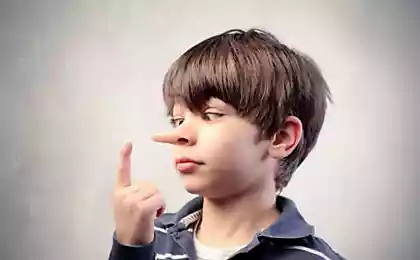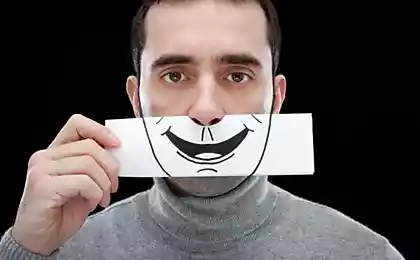938
How do I know if a person is lying?
The following methods for detecting lies, may be useful for managers, employers, and just in everyday life. They will help you distinguish where truth and falsehood, and avoid becoming a victim of fraud. But remember that sometimes ignorance - is bliss.

External signs
Usually it liar may be accompanied by the following symptoms:
- Nervous cough;
- Stuttering;
- Yawning;
- Blinking;
- Her voice;
- Change the color of the face;
- Pant;
- Dry mouth;
- Dry mouth;
- The appearance of droplets of sweat.
Gestures, body language
1. Gestures liar uncertain and limited.
2. A person who lies, avoiding eye contact.
3. Liar constantly touching your face, neck, mouth, etc., while he rarely touches the chest of the heart.
4. When a person lies, his gesticulation becomes unnatural, sometimes even fussy. He can pull the edges of clothing, she shakes off the dust mote shoot (real or imaginary), fingering, rubbing his hands, straightens her hair.
5. Liar can nervously snapping his fingers, pounding foot on the floor and so on. D. - Symptoms of anxiety, to which have certainly have reason liar.
Contradiction gestures and emotions
1. Too often in the first second after your question on the human face shows what he really thinks. If his face expresses surprise, confusion or doubt, and when he speaks of his confidence, is wary.
2. If the rate has slowed gestures, probably a man thought for a moment, to come up with a plausible answer.
3. Lies may be accompanied by a mismatch between words and gestures (nodding his head with negative responses, rocking his head with negative responses).
Interaction
1. A person who is lying chooses defensive, while a person who speaks the truth is on the offensive.
2. Liar feels uncomfortable standing directly in front of the interlocutor, it can turn on you in a different direction or to hide, get away from your field of vision (lean on the cabinet, while actually hiding behind them, lounging on a chair or a chair, having moved down from it under the table, and the like)
3. Liar can unknowingly arranged between them and your foreign objects (a book, a cup of coffee, apple, etc.)
It
1. Liar, answering your question using your own words. For example: "It's you eat the last cookie?" - "No, I did not eat the last cookie!»
2. Liar, gives the answer in abbreviated form. For example, "It's not me!" Instead of "I did not do it!»
3. Liar tries not to make direct statements, answers evasively, and makes allusions, instead of just talking.
4. Liar can be more than natural, adding extra unnecessary details to convince you. He is not silent and tried not to make a pause in his speech.
5. Liar could lose control of the timbre and tone of voice: a higher tone indicates a person experiences stress, like a voice from the increased volume; monotonous speech may be an attempt to lull the interlocutor.
6. It liar may be strongly distorted, mainly affects the syntax and grammar.
Other features, which can be found false
1. If you think someone is lying to you, to change the subject, a liar willing to support you and to calm down. Guilty people will want to translate the conversation in another direction, the innocent would want to sort things out until the end.
2. A person who is lying, uses a lot of humor and sarcasm in his voice.
Naturally, the presence of some of these signs does not make a man a liar. Therefore, finding them at your friend, do not rush to write it in the deceivers. Compare them with his usual behavior.

External signs
Usually it liar may be accompanied by the following symptoms:
- Nervous cough;
- Stuttering;
- Yawning;
- Blinking;
- Her voice;
- Change the color of the face;
- Pant;
- Dry mouth;
- Dry mouth;
- The appearance of droplets of sweat.
Gestures, body language
1. Gestures liar uncertain and limited.
2. A person who lies, avoiding eye contact.
3. Liar constantly touching your face, neck, mouth, etc., while he rarely touches the chest of the heart.
4. When a person lies, his gesticulation becomes unnatural, sometimes even fussy. He can pull the edges of clothing, she shakes off the dust mote shoot (real or imaginary), fingering, rubbing his hands, straightens her hair.
5. Liar can nervously snapping his fingers, pounding foot on the floor and so on. D. - Symptoms of anxiety, to which have certainly have reason liar.
Contradiction gestures and emotions
1. Too often in the first second after your question on the human face shows what he really thinks. If his face expresses surprise, confusion or doubt, and when he speaks of his confidence, is wary.
2. If the rate has slowed gestures, probably a man thought for a moment, to come up with a plausible answer.
3. Lies may be accompanied by a mismatch between words and gestures (nodding his head with negative responses, rocking his head with negative responses).
Interaction
1. A person who is lying chooses defensive, while a person who speaks the truth is on the offensive.
2. Liar feels uncomfortable standing directly in front of the interlocutor, it can turn on you in a different direction or to hide, get away from your field of vision (lean on the cabinet, while actually hiding behind them, lounging on a chair or a chair, having moved down from it under the table, and the like)
3. Liar can unknowingly arranged between them and your foreign objects (a book, a cup of coffee, apple, etc.)
It
1. Liar, answering your question using your own words. For example: "It's you eat the last cookie?" - "No, I did not eat the last cookie!»
2. Liar, gives the answer in abbreviated form. For example, "It's not me!" Instead of "I did not do it!»
3. Liar tries not to make direct statements, answers evasively, and makes allusions, instead of just talking.
4. Liar can be more than natural, adding extra unnecessary details to convince you. He is not silent and tried not to make a pause in his speech.
5. Liar could lose control of the timbre and tone of voice: a higher tone indicates a person experiences stress, like a voice from the increased volume; monotonous speech may be an attempt to lull the interlocutor.
6. It liar may be strongly distorted, mainly affects the syntax and grammar.
Other features, which can be found false
1. If you think someone is lying to you, to change the subject, a liar willing to support you and to calm down. Guilty people will want to translate the conversation in another direction, the innocent would want to sort things out until the end.
2. A person who is lying, uses a lot of humor and sarcasm in his voice.
Naturally, the presence of some of these signs does not make a man a liar. Therefore, finding them at your friend, do not rush to write it in the deceivers. Compare them with his usual behavior.























